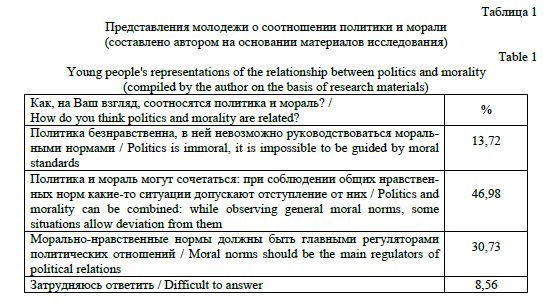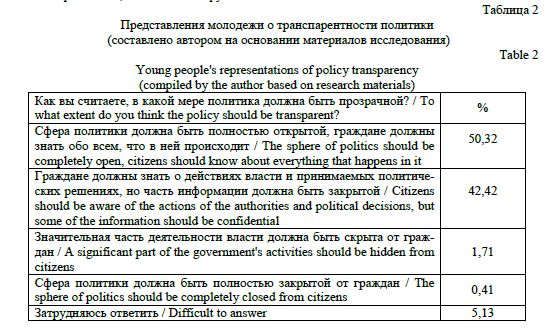Political morality of modern Russian youth:
values, representations, attitudes
In modern socio-humanitarian science, there is a certain lack of research on the moral priorities of young Russian citizens as regulators of their life in the state and society. The study presented in the article was aimed at identifying the political values, ethical representations and attitudes of young people that guide them in assessing the sphere of politics and in their relationships with the state and other political actors. The theoretical and methodological basis of the study was the political-psychological approach, in which values, ideas and attitudes are considered from psychological positions in the structure of moral and political consciousness. The empirical basis of the study was the materials of the All-Russian questionnaire survey and focus group discussions with young people conducted in 2020-21. The results of the study show that young people consider moral values and norms to be a measure of political relations, albeit a rather relative one. It imposes on politicians the moral demands of sincerity, honesty, work for the benefit of citizens, concern for the public interest. Young people leave politicians the right to make mistakes, they are ready to forgive politicians for many mistakes, except for those that are associated with a threat to life and health of people and have serious consequences. Young people consider corruption, wars and violence, violation of laws and rights of citizens to be immoral actions in politics themselves. The meaning-forming foundations of the moral assessment of the sphere of politics by young people are the political values of freedom, human rights, justice, security, self-realization. Young people's representations about duty are differentiated: they recognize the duty of a person, but reject the duty of a citizen. Young people are not ready to take responsibility for others, and sometimes for themselves too. They place the responsibility for providing public goods and satisfying their needs on the state. This reflects paternalistic attitudes, traditional for our political culture. The political morality of youth is contradictory and often relativistic
Figures




Selezneva, А. V. (2022), “Political morality of modern Russian youth: values, representations, attitudes”, Research Result. Sociology and management, 8 (3), 47-60. DOI: 10.18413/2408-9338-2022-8-3-0-4.


















While nobody left any comments to this publication.
You can be first.
Abdokov, S. A. and Bakhitova, F. S. (2003), Dolzhenstvovanie i otvetstvennost' v sootnoshenii svobody i neobkhodimosti [Duty and responsibility in relation to freedom and necessity], SevKavGTU, Stavropol', Russia. (In Russian)
Guseynov, A. A. (2002), Filosofiya, moral', politika [Philosophy, morality, politics], Akademkniga, Moscow, Russia. (In Russian)
Guseynov, A. A. (2004), “Morality and Politics: Lessons from Aristotle”, Vedomosti NII Prikladnoj e'tiki, (24), 94-128. (In Russian)
Yevgenʹyeva, T. V. (2022), “The influence of the socio-political identification of modern youth on notions of moral values and norms”, Humanities and Social Sciences. Bulletin of the Financial University, 12 (2), 84-90. (In Russian)
Yevgenʹyeva, T. V., Selezneva, A. V. and Antonov, D. E. (2021), “Political culture of the Russian students: value-based, figurative-symbolic and behavioral aspects”, Humanities and Social Sciences. Bulletin of the Financial University, 11 (2), 63-71. (In Russian)
Yemel’yanova, T. P. (2016), Sotsial’nye predstavleniya: Istoriya, teoriya i e'mpiricheskie issledovaniya [Social Representations: History, Theory, and Empirical Research], Institut psikhologii RAN, Moscow, Russia. (In Russian)
Zdravomyslova, O. M. (2003), “A new look at society? Changing ideas about power, justice and solidarity”, Politiya: Analiz. Khronika. Prognoz, (1), 34-51.
Zubok, Yu. A. (2020) “Youth: Life Strategies in a New Reality”, Monitoring Public Opinion: Economic and Social Change, (3), 4-12. (In Russian)
Zubok, Yu. A., Lyubutov, A. S. (2021), “Semantic Space of Reality: Structural Taxonomy of the Foundations of Selfregulation of Interactions in the Youth Environment”, Economic and Social Changes: Facts, Trends, Forecast, 14 (3), 167-181. (In Russian)
Zubok, Yu. A., Chuprov, V. (2020), “Youth Life Strategies: Implementation of Expectations and Social Moods”, Monitoring Public Opinion: Economic and Social Change, (3), 13-41. (In Russian)
Zubok, Yu. A., Chuprov, V. I. (2017), “Modern Sociology of Youth: Changing Reality and New Theoretical Approaches” in Gorshkov M.K. (ed.) Rossiya reformiruyushchayasya: yezhegodnik, (15) [Reforming Russia: Yearbook], Novyy khronograf, Moscow, Russia, 12-48. (In Russian)
Kapustin, B. G. (2004), Moral'ny vybor v politike [Moral choice in politics], Izdatel'stvo Moskovskogo universiteta, Moscow, Russia. (In Russian)
Leontʹyev, D. A. (1993), Ocherk psikhologii lichnosti [Essay on personality psychology], Smysl, Moscow, Russia. (In Russian)
Petukhov, V. V. (2020), “Russian youth and its role in the society transformation”, Monitoring Public Opinion: Economic and Social Change, (3), 119-138. (In Russian)
Pecherskaya, N. V. (2001), “Metamorphoses of justice: an etymological analysis of the concept of justice in Russian culture”, Polis. Political studies, (2), 132-146. (In Russian)
Popova, O. V. and Lagutin, O. V. (2019), “Political view of the youth: loyalty or protest?”, RUDN Journal of Political Science, 21 (4), 599-619. (In Russian)
Popova, S. Yu. (2021), ““Imputed” and conscious responsibility of youth”, in
A.V. Selezneva (ed.), Novaya politicheskaya etika rossiyskoy molodezhi [The New Political Ethics of Russian Youth], Akvilon, Moscow, Russia, 116-127. (In Russian)
Samarkina, I. V., Morozova, E. V. and Miroshnichenko, I. V. (2018), “Perception of Europe by young generation in the context of new reality of world politics (the case of Krasnodar)”, Polis. Political Studies, (3), 110-129. (In Russian)
Zubok, Yu. A., Aleksandrova, O. A., Bulanova, M. B. (2022), Samoregulyatsiya v molodezhnoy srede: tipologizatsiya i modelirovaniye [Self-regulation in the youth environment: typology and modeling], Epitsentr, Belgorod, Russia. (In Russian)
Selezneva, A., Tulegenova, D. (2022), “The Traditional and New in the Value Orientations of Russian Youth: Results of the Expert Survey”, Polylogos [Online], 6 (2), available at: https://polylogosjournal.ru/s258770110020714-7-1/ (Accessed 15 June 2022). (In Russian)
Selezneva, A. V. (2019), “Conceptual and methodological foundations of the political and psychological analysis of political values”, Tomsk State University Journal of Philosophy, Sociology and Political Science, (49), 177-192. (In Russian)
Selezneva, A. V. and Antonov, D. E. (2020), “The value bases of the civic consciousness of the Russian youth’, Tomsk State University Journal of Philosophy, Sociology and Political Science, (58), 227-241. (In Russian)
Smirnov R. G. (2019), “Operationalization of the “Online Generation” phenomenon”, Digital sociology, 2 (4), 31-38. (In Russian)
Khazykova, T. S. (2009), “Personal responsibility as a socio-psychological phenomenon”, Izvestiya Volgogradskogo gosudarstvennogo pedagogicheskogo universiteta, (6), 36-40. (In Russian)
Chuprov, V. I. (2018), “Self-Regulation of the Youth Life in Cultural Space: the Concept of Socio-Cultural Mechanism”, Humanitarian of the South of Russia, 7 (4), 13-25. (In Russian)
Shapovalova, I. S., Kisilenko, A. V. (2018), “Spiritual and Moral Choices in the Life Strategies of Youth: Experience of Sociological Research”, Central Russian Journal of Social Sciences, 13 (6), 14-28. (In Russian)
Shatilov, A. B. (2020), “Moral deterioration of the power as a factor of destabilization of political regimes”, Vlast', 28 (4), 9-17. (In Russian)
Shashkova, Ya. Yu., Aseev, S. Yu. and Kazantsev, D. A. (2021), “The Siberian and Far Eastern federal districts' youth and their value-based perceptions of politics”, Kaspijskij region: politika, e'konomika, kul'tura, (2), 39-50. (In Russian)
Shestopal, E. B. (2011), “Representations, images and values of democracy in Russian society”, Politiya: Analiz. Khronika. Prognoz, (3), 34-47.
Allport, F. H. (1924), “Social Attitudes and Social Consciousness”, In Social Psychology, Houghton Mifflin Company, Boston, USA, 320-335. (In Russian)
Bem, D. J. (1970), Beliefs, Attitudes, and Human Affairs, Brooks/Cole, Belmont, Calif., USA.
Bishop, J. A., Liu, H. and Qu, Z. (2013), “Individual Perceptions of Distributional Fairness in China”, Comparative Economic Studies, 56 (1), 25-41.
Feldman, S. (2003), “Values, ideology, and structure of political attitudes”, In Huddy N, Sears D.O. & Jervis R. (Eds.), Оxford Handbook of Political Psychology, Oxford University Press, New York, USA, 477-508.
Gudkov, L., Zorkaya, N., Kochergina, E., Pipiya, K. and Ryseva A. Russia’s ‘Generation Z’: Attitudes and Values, Library of the Friedrich-Ebert-Stiftung. 2020. [Online], available at: https://library.fes.de/pdf-files/bueros/moskau/16134.pdf (Accessed 26 July 2022).
Hatemi, P. K., Crabtree, Ch. аnd Smith K. B. (2019), “Ideology Justifies Morality: Political Beliefs Predict Moral Foundations”, American Journal of Political Science, 63 (2), 788-806.